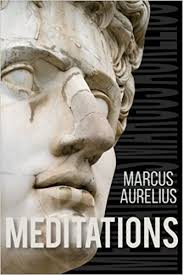Meditations Page #22
Meditations is a series of personal writings by Marcus Aurelius, Roman Emperor from 161 to 180 AD, recording his private notes to himself and ideas on Stoic philosophy. Marcus Aurelius wrote the 12 books of the Meditations in Koine Greek as a source for his own guidance and self-improvement.
XII. See what Crates pronounceth concerning Xenocrates himself. XIII. Those things which the common sort of people do admire, are most of them such things as are very general, and may be comprehended under things merely natural, or naturally affected and qualified: as stones, wood, figs, vines, olives. Those that be admired by them that are more moderate and restrained, are comprehended under things animated: as flocks and herds. Those that are yet more gentle and curious, their admiration is commonly confined to reasonable creatures only; not in general as they are reasonable, but as they are capable of art, or of some craft and subtile invention: or perchance barely to reasonable creatures; as they that delight in the possession of many slaves. But he that honours a reasonable soul in general, as it is reasonable and naturally sociable, doth little regard anything else: and above all things is careful to preserve his own, in the continual habit and exercise both of reason and sociableness: and thereby doth co-operate with him, of whose nature he doth also participate; God. XIV. Some things hasten to be, and others to be no more. And even whatsoever now is, some part thereof hath already perished. Perpetual fluxes and alterations renew the world, as the perpetual course of time doth make the age of the world (of itself infinite) to appear always fresh and new. In such a flux and course of all things, what of these things that hasten so fast away should any man regard, since among all there is not any that a man may fasten and fix upon? as if a man would settle his affection upon some ordinary sparrow living by him, who is no sooner seen, than out of sight. For we must not think otherwise of our lives, than as a mere exhalation of blood, or of an ordinary respiration of air. For what in our common apprehension is, to breathe in the air and to breathe it out again, which we do daily: so much is it and no more, at once to breathe out all thy respirative faculty into that common air from whence but lately (as being but from yesterday, and to-day), thou didst first breathe it in, and with it, life. XV. Not vegetative spiration, it is not surely (which plants have) that in this life should be so dear unto us; nor sensitive respiration, the proper life of beasts, both tame and wild; nor this our imaginative faculty; nor that we are subject to be led and carried up and down by the strength of our sensual appetites; or that we can gather, and live together; or that we can feed: for that in effect is no better, than that we can void the excrements of our food. What is it then that should be dear unto us? to hear a clattering noise? if not that, then neither to be applauded by the tongues of men. For the praises of many tongues, is in effect no better than the clattering of so many tongues. If then neither applause, what is there remaining that should be dear unto thee? This I think: that in all thy motions and actions thou be moved, and restrained according to thine own true natural constitution and Construction only. And to this even ordinary arts and professions do lead us. For it is that which every art doth aim at, that whatsoever it is, that is by art effected and prepared, may be fit for that work that it is prepared for. This is the end that he that dresseth the vine, and he that takes upon him either to tame colts, or to train up dogs, doth aim at. What else doth the education of children, and all learned professions tend unto? Certainly then it is that, which should be dear unto us also. If in this particular it go well with thee, care not for the obtaining of other things. But is it so, that thou canst not but respect other things also? Then canst not thou truly be free? then canst thou not have self-content: then wilt thou ever be subject to passions. For it is not possible, but that thou must be envious, and jealous, and suspicious of them whom thou knowest can bereave thee of such things; and again, a secret underminer of them, whom thou seest in present possession of that which is dear unto thee. To be short, he must of necessity be full of confusion within himself, and often accuse the Gods, whosoever stands in need of these things. But if thou shalt honour and respect thy mind only, that will make thee acceptable towards thyself, towards thy friends very tractable; and conformable and concordant with the Gods; that is, accepting with praises whatsoever they shall think good to appoint and allot unto thee. XVI. Under, above, and about, are the motions of the elements; but the motion of virtue, is none of those motions, but is somewhat more excellent and divine. Whose way (to speed and prosper in it) must be through a way, that is not easily comprehended. XVII. Who can choose but wonder at them? They will not speak well of them that are at the same time with them, and live with them; yet they themselves are very ambitious, that they that shall follow, whom they have never seen, nor shall ever see, should speak well of them. As if a man should grieve that he hath not been commended by them, that lived before him. XVIII. Do not ever conceive anything impossible to man, which by thee cannot, or not without much difficulty be effected; but whatsoever in general thou canst Conceive possible and proper unto any man, think that very possible unto thee also. XIX. Suppose that at the palestra somebody hath all to-torn thee with his nails, and hath broken thy head. Well, thou art wounded. Yet thou dost not exclaim; thou art not offended with him. Thou dost not suspect him for it afterwards, as one that watcheth to do thee a mischief. Yea even then, though thou dost thy best to save thyself from him, yet not from him as an enemy. It is not by way of any suspicious indignation, but by way of gentle and friendly declination. Keep the same mind and disposition in other parts of thy life also. For many things there be, which we must conceit and apprehend, as though we had had to do with an antagonist at the palestra. For as I said, it is very possible for us to avoid and decline, though we neither suspect, nor hate. XX. If anybody shall reprove me, and shall make it apparent unto me, that in any either opinion or action of mine I do err, I will most gladly retract. For it is the truth that I seek after, by which I am sure that never any man was hurt; and as sure, that he is hurt that continueth in any error, or ignorance whatsoever.
Translation
Translate and read this book in other languages:
Select another language:
- - Select -
- 简体中文 (Chinese - Simplified)
- 繁體中文 (Chinese - Traditional)
- Español (Spanish)
- Esperanto (Esperanto)
- 日本語 (Japanese)
- Português (Portuguese)
- Deutsch (German)
- العربية (Arabic)
- Français (French)
- Русский (Russian)
- ಕನ್ನಡ (Kannada)
- 한국어 (Korean)
- עברית (Hebrew)
- Gaeilge (Irish)
- Українська (Ukrainian)
- اردو (Urdu)
- Magyar (Hungarian)
- मानक हिन्दी (Hindi)
- Indonesia (Indonesian)
- Italiano (Italian)
- தமிழ் (Tamil)
- Türkçe (Turkish)
- తెలుగు (Telugu)
- ภาษาไทย (Thai)
- Tiếng Việt (Vietnamese)
- Čeština (Czech)
- Polski (Polish)
- Bahasa Indonesia (Indonesian)
- Românește (Romanian)
- Nederlands (Dutch)
- Ελληνικά (Greek)
- Latinum (Latin)
- Svenska (Swedish)
- Dansk (Danish)
- Suomi (Finnish)
- فارسی (Persian)
- ייִדיש (Yiddish)
- հայերեն (Armenian)
- Norsk (Norwegian)
- English (English)
Citation
Use the citation below to add this book to your bibliography:
Style:MLAChicagoAPA
"Meditations Books." Literature.com. STANDS4 LLC, 2025. Web. 25 Feb. 2025. <https://www.literature.com/book/meditations_76>.








Discuss this Meditations book with the community:
Report Comment
We're doing our best to make sure our content is useful, accurate and safe.
If by any chance you spot an inappropriate comment while navigating through our website please use this form to let us know, and we'll take care of it shortly.
Attachment
You need to be logged in to favorite.
Log In